英式英语和美式英语的区别(英文版)
英式英语和美式英语的5个区别

英式英语和美式英语的5个区别英语是目前全球使用最广泛的语言,在多个国家和地区通用。
随着时间的推移各个地区的英语也出现了一些差异,比如美式英语和英式英语。
目前美式英语主要通用于美国和中美洲等地区,英式英语通用于英国、澳大利亚和新西兰等英联邦国家。
英式英语和美式英语主要有以下几点区别:一、拼写英式英语和美式英语的拼写差异主要有两种:1. 单词个别字母的改变以-ence结尾的单词在美式英语中是-ense,例如defence(英)/defense(美),licence(英)/license(美)以-re结尾的单词在美式英语中是-er,例如metre(英)/meter(美),centre(英)/center(美)以-ise结尾的动词在美式英语中是-ize,例如realise(英)/realize(美)。
2、美语的简化美式英语相比英式英语不少单词的拼写会更加简化,比如美语中删除了结尾不发音的-me和-ue,将programme简化为program,catalogue简化为catalog,同时,对于以-our结尾的词,美语中也将中间的u删去,例如colour(英)/color(美)写作中使用美式拼写或英式拼写都可以,但要注意保持一致,如果你一开始选的是美式拼写,那就通篇使用美式拼写,不要两种拼写方式混杂,不然会显得很不专业。
如果你不确定一个单词是属于美式英语还是英式英语,可以查一查词典,词条处会给出清楚的说明二、发音英语和美语发音主要有以下差异:1、美语中有明显的r音,而英语中没有。
例如worker在美语中是/ˈwɜːrkər/,在英语中是/ˈwɜːkə/2、在ask/pass/dance这类词中,英式英语将字母a读成/ɑː/,而美式英语读成/æ/,比如ask在英语中是/ɑːsk/,在美语中是/æsk/3、在box/crop/ironic这一类词中,英式英语中将字母o读成/ɒ/,例如box /bɒks/,而美式英语中读成/ɑː/,例如box /bɑːks/此外,还有一些单词在英式英语和美式英语中的发音有很大差异,比如either /ˈaɪðə/(英)/ˈiːðər/(美),leisure /ˈleʒə/(英)/ˈliːʒər/(美)等,这部分单词平时可以注意收集。
美式英语与英式英语之间的差异

英国英语就是英国人说的英语,而南部英国人所说的话则是英国的标准英语。
美国英语就是美国人说的英语。
为什么英国英语和美国英语有差别?这里有历史的原因。
美国是一个移民国家,最早的移民就是17世纪来自英国而在美国东部定居的英国移民,到18世纪后期,英国移民已有四百多万。
他们说的英语大致上还是英国英语。
但随后的两个世纪以来,陆续有大批的移民来自爱尔兰、德国、法国、斯堪纳维亚国家、东欧和南欧的一些国家。
此外还有从墨西哥来的西班牙人,和亚洲来的中国人和日本人。
所有这些人都须学英语才能生活下去,而这些人原来所说的本国语又都对英语带来影响。
但是总的来说,美国英语主要是17世纪英国英语在美国的进一步发展。
美国英语继承了英国英语的语法结构和基本词汇,但是在词汇方面也吸收了一些外来成分。
这些外来成分来自美洲印第安人的语言和许多移民国家的语言。
British English is the British say English, and south British said is Britain's standard English. American English is the American people say English.Why British English and American English has difference? Here are the historical reason. The United States is a nation of immigrants, and of the first settlers came from England and is 17 th century in the eastern United States settled English settlers, to the late eighteenth century, Britain more than four hundred immigrants. They say English in general or British English. But the next two centuries, has a large number of immigrants from Ireland, Germany, France, Campbell, Scandinavia, eastern and southern Europe countries of some countries. In addition to the Spanish people from Mexico, and Asia to the Chinese and Japanese. All of these people must learn English can live, but these people originally said to English native language and impact. But in general, the American English major is 17 th century British English in the further development of the United States. American English inherited British English grammar structure and basic vocabulary, but also in vocabulary absorbed some foreign elements. These foreign component from American indians language and many immigrants the language of the country.美国英语和英国英语之间的区别有以下几个方面:American English and British English is the difference between the following aspects:1.In the words:gas/gasoline (美) —— petrol(英); baggage (美)——luggage(英); package (美)——parcel(英); mail(美)——post(英);美国英语所特有的词汇和短语可分为三类:第一类是美国人创造的新词,如movie(电影)、bootlegger(贩私酒人)、O.K.(全对)、flatfooted(直截了当的)等;The peculiar to the English words and phrases can be divided into three groups: the first kind is the American people to create new words, such as movie (film), bootlegger (bootlegging wine), O.K. (in the), flatfooted (direct);第二类是有些词虽然在英国英语中仍旧使用,但美国人给予新的涵义,如homely 这词,英国英语意为“家庭的”,但美国英语则有“不漂亮”的意思;The second type is some words while in British English still use, but the Americanpeople to give new meaning, such as homely this word, British English meaning"family", but the United States is English "not beautiful" mean;又如bug这词英国英语“臭虫”,美国英语则“昆虫”;And as a bug the word "bugs" British English and American English is "insects";再如mad这词英国英语意为“疯狂的”,但美国英语则为“生气的”与angry 意思相同;Be like again mad this word British English meaning "crazy", but the American English is "angry" means the same with angry;第三类为有些词在英国已失去原来的某种意义,但在美国还保留下来,如fall这词,美国英语中有“秋季”的意思,但在英国早已没有这个意义;The third class for some of the words in Britain has lost the original some kind of meaning, but the United States also remained, and fall like the word, the American English is "autumn" mean, but in Britain had no the meaning;再如sick这词,美国意为“有病的”,而在英国用ill而不用sick。
y英式英语和美式英语区别英语作文
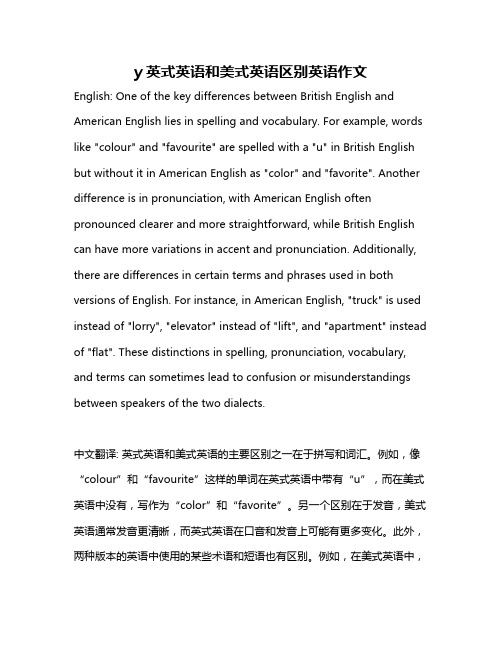
y英式英语和美式英语区别英语作文English: One of the key differences between British English and American English lies in spelling and vocabulary. For example, words like "colour" and "favourite" are spelled with a "u" in British English but without it in American English as "color" and "favorite". Another difference is in pronunciation, with American English often pronounced clearer and more straightforward, while British English can have more variations in accent and pronunciation. Additionally, there are differences in certain terms and phrases used in both versions of English. For instance, in American English, "truck" is used instead of "lorry", "elevator" instead of "lift", and "apartment" instead of "flat". These distinctions in spelling, pronunciation, vocabulary, and terms can sometimes lead to confusion or misunderstandings between speakers of the two dialects.中文翻译: 英式英语和美式英语的主要区别之一在于拼写和词汇。
美式英语和英式英语的区别
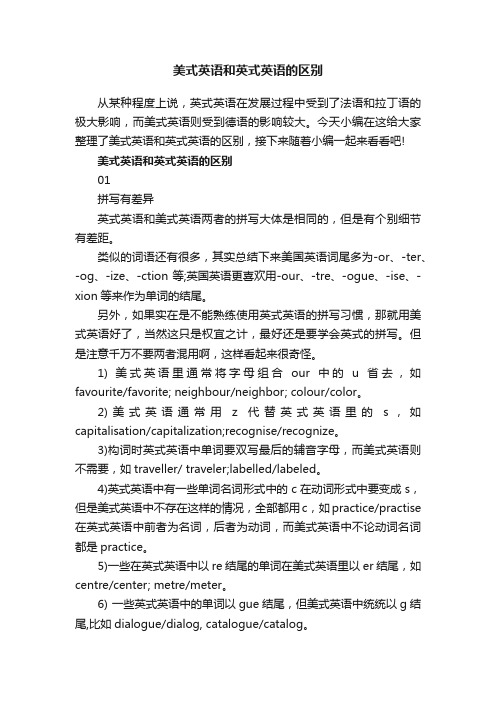
美式英语和英式英语的区别从某种程度上说,英式英语在发展过程中受到了法语和拉丁语的极大影响,而美式英语则受到德语的影响较大。
今天小编在这给大家整理了美式英语和英式英语的区别,接下来随着小编一起来看看吧!美式英语和英式英语的区别01拼写有差异英式英语和美式英语两者的拼写大体是相同的,但是有个别细节有差距。
类似的词语还有很多,其实总结下来美国英语词尾多为-or、-ter、-og、-ize、-ction等;英国英语更喜欢用-our、-tre、-ogue、-ise、-xion等来作为单词的结尾。
另外,如果实在是不能熟练使用英式英语的拼写习惯,那就用美式英语好了,当然这只是权宜之计,最好还是要学会英式的拼写。
但是注意千万不要两者混用啊,这样看起来很奇怪。
1) 美式英语里通常将字母组合our中的u省去,如favourite/favorite; neighbour/neighbor; colour/color。
2)美式英语通常用z代替英式英语里的s,如capitalisation/capitalization;recognise/recognize。
3)构词时英式英语中单词要双写最后的辅音字母,而美式英语则不需要,如traveller/ traveler;labelled/labeled。
4)英式英语中有一些单词名词形式中的c在动词形式中要变成s,但是美式英语中不存在这样的情况,全部都用c,如practice/practise 在英式英语中前者为名词,后者为动词,而美式英语中不论动词名词都是practice。
5)一些在英式英语中以re结尾的单词在美式英语里以er结尾,如centre/center; metre/meter。
6) 一些英式英语中的单词以gue结尾,但美式英语中统统以g结尾,比如dialogue/dialog, catalogue/catalog。
02用词有区别在词汇的使用上,最能够表现出来英式和美式英语的差异。
美式英语与英式英语的区别
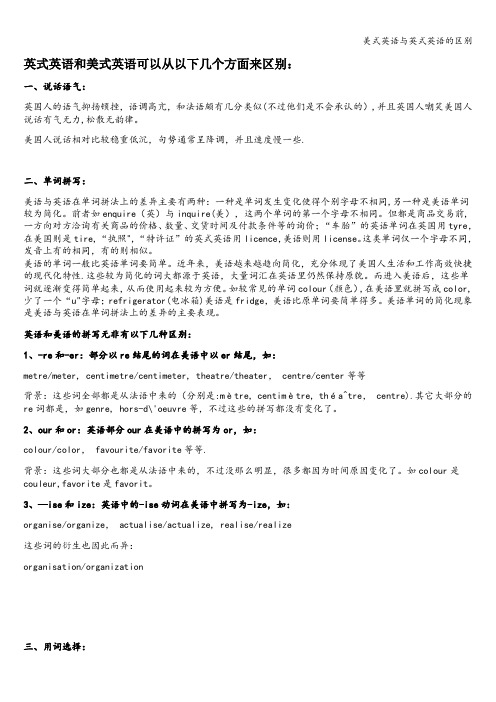
英式英语和美式英语可以从以下几个方面来区别:一、说话语气:英国人的语气抑扬顿挫,语调高亢,和法语颇有几分类似(不过他们是不会承认的),并且英国人嘲笑美国人说话有气无力,松散无韵律。
美国人说话相对比较稳重低沉,句势通常呈降调,并且速度慢一些.二、单词拼写:美语与英语在单词拼法上的差异主要有两种:一种是单词发生变化使得个别字母不相同,另一种是美语单词较为简化。
前者如enquire(英)与inquire(美),这两个单词的第一个字母不相同。
但都是商品交易前,一方向对方洽询有关商品的价格、数量、交货时间及付款条件等的询价;“车胎”的英语单词在英国用tyre,在美国则是tire,“执照",“特许证”的英式英语用licence,美语则用license。
这类单词仅一个字母不同,发音上有的相同,有的则相似。
美语的单词一般比英语单词要简单。
近年来,美语越来越趋向简化,充分体现了美国人生活和工作高效快捷的现代化特性.这些较为简化的词大都源于英语,大量词汇在英语里仍然保持原貌。
而进入美语后,这些单词就逐渐变得简单起来,从而使用起来较为方便。
如较常见的单词colour(颜色),在美语里就拼写成color,少了一个“u"字母;refrigerator(电冰箱)美语是fridge,美语比原单词要简单得多。
美语单词的简化现象是美语与英语在单词拼法上的差异的主要表现。
英语和美语的拼写无非有以下几种区别:1、-re和-er:部分以re结尾的词在美语中以er结尾,如:metre/meter, centimetre/centimeter, theatre/theater, centre/center等等背景:这些词全部都是从法语中来的(分别是:mètre, centimètre, théa^tre, centre).其它大部分的re词都是,如genre, hors-d\'oeuvre等,不过这些的拼写都没有变化了。
英美两国英语差别英语作文
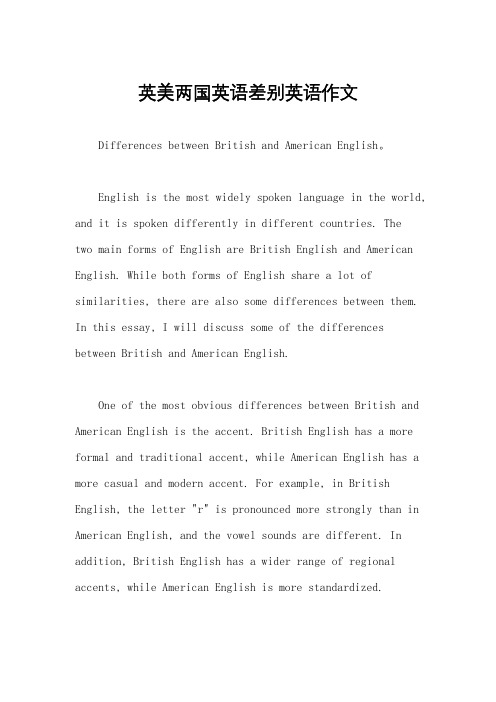
英美两国英语差别英语作文Differences between British and American English。
English is the most widely spoken language in the world, and it is spoken differently in different countries. Thetwo main forms of English are British English and American English. While both forms of English share a lot of similarities, there are also some differences between them. In this essay, I will discuss some of the differences between British and American English.One of the most obvious differences between British and American English is the accent. British English has a more formal and traditional accent, while American English has a more casual and modern accent. For example, in British English, the letter "r" is pronounced more strongly than in American English, and the vowel sounds are different. In addition, British English has a wider range of regional accents, while American English is more standardized.Another difference between British and American English is the spelling. There are many words that are spelled differently in the two forms of English. For example, in British English, the word "colour" is spelled with a "u", while in American English, it is spelled "color". Similarly, in British English, the word "centre" is spelled with an "re", while in American English, it is spelled "center". These spelling differences can cause confusion for people who are learning English, as they need to remember which spelling to use in different situations.Grammar is another area where British and American English differ. For example, in British English, collective nouns are often treated as plural, while in American English, they are treated as singular. So, in British English, you would say "The team are playing well", whilein American English, you would say "The team is playing well". Similarly, in British English, the past participleof "get" is "got", while in American English, it is "gotten".Vocabulary is also an area where British and AmericanEnglish differ. There are many words that are useddifferently in the two forms of English. For example, in British English, the word "biscuit" refers to a small,sweet cake, while in American English, it refers to a small, savory cake. Similarly, in British English, the word "boot" refers to the trunk of a car, while in American English, it refers to a type of footwear. These differences in vocabulary can cause confusion for people who are learning English, as they need to learn which words are used inwhich context.In conclusion, while British and American English share a lot of similarities, there are also some differences between them. These differences can cause confusion for people who are learning English, but they also add richness and diversity to the language. As English continues to evolve and change, it will be interesting to see how these differences continue to develop.。
英式英语和美式英语的区别作文
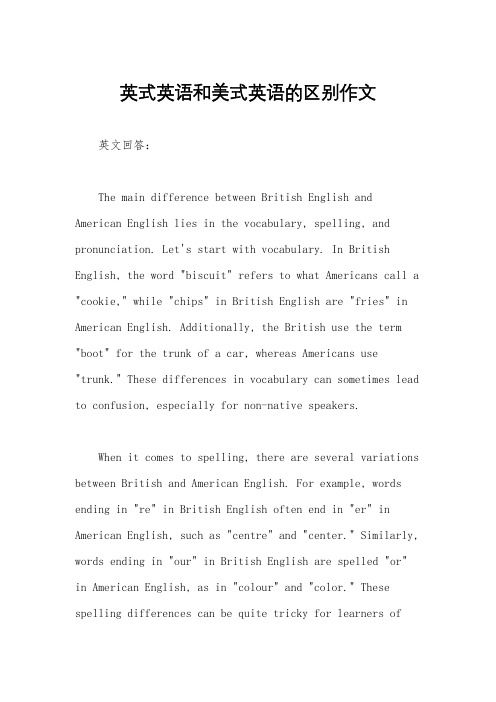
英式英语和美式英语的区别作文英文回答:The main difference between British English and American English lies in the vocabulary, spelling, and pronunciation. Let's start with vocabulary. In British English, the word "biscuit" refers to what Americans call a "cookie," while "chips" in British English are "fries" in American English. Additionally, the British use the term "boot" for the trunk of a car, whereas Americans use "trunk." These differences in vocabulary can sometimes lead to confusion, especially for non-native speakers.When it comes to spelling, there are several variations between British and American English. For example, words ending in "re" in British English often end in "er" in American English, such as "centre" and "center." Similarly, words ending in "our" in British English are spelled "or" in American English, as in "colour" and "color." These spelling differences can be quite tricky for learners ofEnglish, as they have to remember which version to use in different contexts.Pronunciation is another key difference between the two varieties of English. For instance, the British tend todrop the "r" sound at the end of words, while Americans pronounce it. This can be heard in words like "car" and "water." Additionally, the vowel sounds in certain wordsare also pronounced differently. For example, the word "schedule" is pronounced "shed-yool" in British English and "sked-yool" in American English.In terms of grammar, there are some differences as well. For instance, the use of the present perfect tense is more common in British English, while Americans often use the simple past tense in the same context. For example, aBritish person might say, "I have just eaten," whereas an American would say, "I just ate."Overall, these differences between British English and American English can sometimes lead to misunderstandings, but they also add richness and diversity to the Englishlanguage.中文回答:英式英语和美式英语的主要区别在于词汇、拼写和发音。
英式英语和美式英语的区别

xxxxxx
1
2 3 4
英式英语和美式英语的区别
英式英语和美式英 语在发音、拼写、 用词、短语和习惯 表达等方面存在一 些区别。以下是具
体的例子
发音
发音
1.1 元音
美式英语中:单词的元音发音比较夸张 ,而英式英语则更注重发音的准确性和 清晰度。例如,"ah"在美式英语中可能 被发音为"awe",而在英式英语中则是 "ah" 在一些单词中:英式英语和美式英语使 用不同的元音,例如,"tomorrow"在英 式英语中发音为"t[ Article-295 ]", 而在美式英语中发音为"t[ Article-284 ]"
2.2 异形异义词
拼写
有些单词在英式英语和美式 英语中的拼写完全不同:例 如,"climber"在英式英语中 拼写为"climber",而在美式 英语中拼写为"climber"
需要注意的是:这些单词的 拼写形式在不同的语境中可 能会有所不同
用词和短语
用词和短语
一些日常生活中的常用词汇和短语在英式英语和美式英语中有不同的表达方式
在一些专业领域(如科学、医学等)
英式英语和美式英语的用词和短语也有所不同。例如,"lab"在英式英语中通常指代"实验室",而在美式 英语中通常指代"实验室" Nhomakorabea 习惯表达
习惯表达
在一些习惯表达中
英式英语和美式英语有不同的表达方式,例 如,"in the morning"在英式英语中通常说 成"in the a.m.",而在美式英语中说成"in the AM"
- 1、下载文档前请自行甄别文档内容的完整性,平台不提供额外的编辑、内容补充、找答案等附加服务。
- 2、"仅部分预览"的文档,不可在线预览部分如存在完整性等问题,可反馈申请退款(可完整预览的文档不适用该条件!)。
- 3、如文档侵犯您的权益,请联系客服反馈,我们会尽快为您处理(人工客服工作时间:9:00-18:30)。
Differences between American and British English Differences in vocabularyWhen it comes to vocabulary, American English differ significantly from British English. Sometimes the same word has different meaning. There are also different words with the same meaning. A few examples are given below.American English British EnglishAirplane AeroplaneApartment Flat/ apartmentArea code Dialling codeAttorney, lawyer Barrister, solicitorBusy Engaged (phone)Cab/taxi T axiCan TinCandy SweetsCheck/bill BillCookie, cracker BiscuitCorn MaizeCrib CotCrazy MadDiaper NappyDumb, stupid StupidElevator LiftEraser Rubber, eraserFall, autumn AutumnFaucet, tap T apFirst floor, second floor Ground floor, first floorFlashlight TorchFrench fries ChipsGarbage, trash RubbishGarbage can, trashcan Dustbin, rubbish binGas, gasoline PetrolHighway, freeway Main road, motorwayHood BonnetIntersection CrossroadsMad AngryMail PostMean NastyMovie, film FilmPants, trousers TrousersPavement Road surfacePitcher JugPotato chips CrispsPurse HandbagRaise Rise (salary)Railroad RailwayRest room Public toiletSchedule, timetable TimetableSneakers Trainers (sports shoes)Stand in line QueueStingy MeanStore, shop ShopSubway UndergroundTruck Van, lorryTrunk Boot (of a car)Stand in line QueueTwo weeks Fortnight, two weeksVacation Holiday(s)Windshield WindscreenZee ZedStand in line QueueZipper ZipDifference between American and British English Differences in usageAbbreviationsWe usually write abbreviations without full stops in modern British English. Full stops (US 憄eriods�) are normal in American English.Mr (US Mr.) = MisterDr (US Dr.) = DoctorLtd (US Ltd.) = Limited (company)Kg (US kg.) = kilogramAll and all ofBefore a noun with a determiner (e.g. the, this, my), all and all of are both possible in British English. American English usually has all of.•She has eaten all (of) the cake. (GB)•She has eaten all of the cake. (US)•All (of) my friends like riding. (GB)•All of my friends like riding. (US)Expressions with prepositions and particlesDifferent from/than (US)Different from/to (GB)Check something (out) (US)Check something (GB)Do something over/again (US)Do something again (GB)Live on X street (US)Live in X street (GB)On a team (US)In a team (GB)Monday through/to Friday (US)Monday to Friday (GB)Informal use of likeIn an informal style, like is often used instead of as if/though, especially in American English. This is not considered correct in a formal style.•It seems like it is going to rain.•He sat there smiling like it was his birthday.OnIn American English, it is common to leave out on before the days of the week.•I am seeing her Sunday morning. (US)British people say at the weekend; Americans say on the weekend.•What did you do at the weekend? (GB)•What did you do on the weekend? (US)In and forIn American English, in can be used, like for, to talk about periods up to the present. (British English only for).•I haven't seen her in years. (US)Both and both ofBefore a noun with a determiner (e.g. the,this, my), both and both of are both possible in British English. In American English, both of is usual.•Both (of) my parents like riding. (GB) •Both of my parents like riding. (US)In after negatives and superlativesAfter negatives and superlatives, in can be used to talk about duration. This is especially common in American English.•I haven't seen him for/in months.•It was the worst storm for/in tenyears.In British English, in is not normally used with this meaning.•I haven't seen him for months. (GB)Shan'tIn British English, I shan't is sometimes used in refusals. This is very unusual in American English.•I don't care what you say, I won't/shan't do it. (GB)•I don抰care what you say, I won'tdo it. (US)ShallQuestions with shall I/we are used (especially in British English) to ask for instructions or decisions, to offer services and to make suggestions. This is not common in American English.•Shall I open the window?•Shall we go out for a meal?WillWe often use will in threats and promises. Shall is also possible in British English, especially after I and we. In AmericanEnglish, shall is not used in threats andpromises.•I will/shall give you a teddy bear foryour birthday. (GB)•I will give you a teddy bear for yourbirthday. (US)Have (got) + infinitiveHave (got) + infinitive can be used, likemust, to express certainty. This is mainly anAmerican English structure, but it is nowbecoming more common in British English.•I don't believe you. You have (got)to be joking. (= You must be joking.)Would and shouldAfter I and we, should can be used in BritishEnglish with the same meaning as would.•If we had a map wewould/should be able to get out ofhere. (GB)•If we had a map we would we able toget out of here. (US)Conditional would is sometimes used in bothclauses of an if-sentence. This is commonin spoken American English.•It would be better if they would telleverybody in advance.American and British English: differences in spellingA number of words end in -our in British English and -or in American English. Some words end in -er in American English and -re in British English. Many verbs which end in -ize in American English can be spelt in British English with -ize or -ise. In British English -I is doubled in an unstressed syllable before a suffix beginning with a vowel, while in American English it is not doubled.American English and British EnglishDifferences in grammarThese two varieties of English are very similar that most American and British speakers can understand each other without great difficulty. There are, however, a few differences of grammar, vocabulary and spelling. The following guide is meant to point out the principal differences between American English (AE) and British English (BE).Differences in GrammarUse of the Present PerfectThe British use the present perfect to talk about a past action which has an effect on the present moment. In American English both simple past and present perfect are possible in such situations.•I have lost my pen. Can you lend me yours? (BE)•I lost my pen. OR I have lost my pen. (AE)•He has gone home. (BE)•He went home. OR He has gone home. (AE)Other differences include the use of already, just and yet. The British use the present perfect with these adverbs of indefinite time. In American English simple past and present perfect are both possible.•He has just gone home. (BE)•He just went home. OR He has just gone home. (AE)•I have already seen this movie. (BE)•I have already seen this movie. OR I already saw this movie. (AE)•She hasn't come yet. (BE)•She hasn't come yet. OR She didn't come yet. (AE)PossessionThe British normally use have got to show possession. In American English have (in the structure do you have) and have got are both possible.•Have you got a car? (BE)•Do you have a car? OR Have you got a car? (AE)Use of the verb GetIn British English the past participle of get is got. In American English the past participle of get is gotten, except when have got means have.•He has got a prize. (BE)•He has gotten a prize. (AE)•I have got two sisters. (BE)•I have got two sisters. (=I have two sisters.)(AE)Will/ShallIn British English it is fairly common to use shall with the first person to talk about the future. Americans rarely use shall.•I shall/will never forget this favour. (BE)•I will never forget this favour. (AE)In offers the British use shall. Americans use should.•Shall I help you with the homework? (BE)•Should I help you with the homework? (AE)NeedIn British English needn't and don't need to are both possible. Americans normally use don't need to.•You needn't reserve seats. OR You don't need to reserve seats. (BE)•You don't need to reserve seats. (AE)American and British EnglishDifferences in Grammar # 2Use of the SubjunctiveIn American English it is particularly common to use subjunctive after words like essential, vital, important, suggest, insist, demand, recommend, ask, advice etc. (Subjunctive is a special kind of present tense which has no -s in the third person singular. It is commonly used in that clauses after words which express the idea that something is important or desirable.) In British English the subjunctive is formal and unusual. British people normally use should + Infinitive or ordinary present and past tenses.•It is essential that every child get an opportunity to learn. (AE)•It is essential that every child gets an opportunity to learn. (BE)•It is important that he be told. (AE)•It is important that he should be told. (BE)•She suggested that I see a doctor. (AE)•She suggested that I should see a doctor. (BE)•She insisted that I go with her. (AE)•She insisted that I should go with her. (BE)Collective NounsCollective nouns like jury, team, family, government etc., can take both singular and plural verbs in British English. In American English they normally take a singular verb.•The committee meets/meet tomorrow. (BE)•The committee meets tomorrow. (AE)•The team is/are going to lose. (BE)•The team is going to lose. (AE)Auxiliary verb + doIn British English it is common to use do as a substitute verb after an auxiliary verb. Americans do not normally use do after an auxiliary verb.•May I have a look at your papers? You may (do) (BE)•You may. (AE)•You were supposed to have finished your homework before you went to bed.•I have (done). (BE)•I have. (AE)As if/ likeIn American English it is common to use like instead of as if/ as though. This is not correct in British English.•He talks as if he knew everything. (BE)•He talks like/as if he knew everything. (AE)In American English it is also common to use were instead of was in unreal comparisons.•He talks as if he was rich. (BE)•He talks as if he were rich. (AE)The indefinite pronoun OneAmericans normally use he/she, him/her, his/her to refer back to one. In British English one is used throughout the sentence.•One must love one's country. (BE)•One must love his/her country. (AE)Mid position adverbsIn American English mid position adverbs are placed before auxiliary verbs and other verbs. In British English they are placed after auxiliary verbs and before other verbs.•He has probably arrived now. (BE)•He probably has arrived now. (AE)•I am seldom late for work. (BE)•I seldom am late for work. (AE)。
